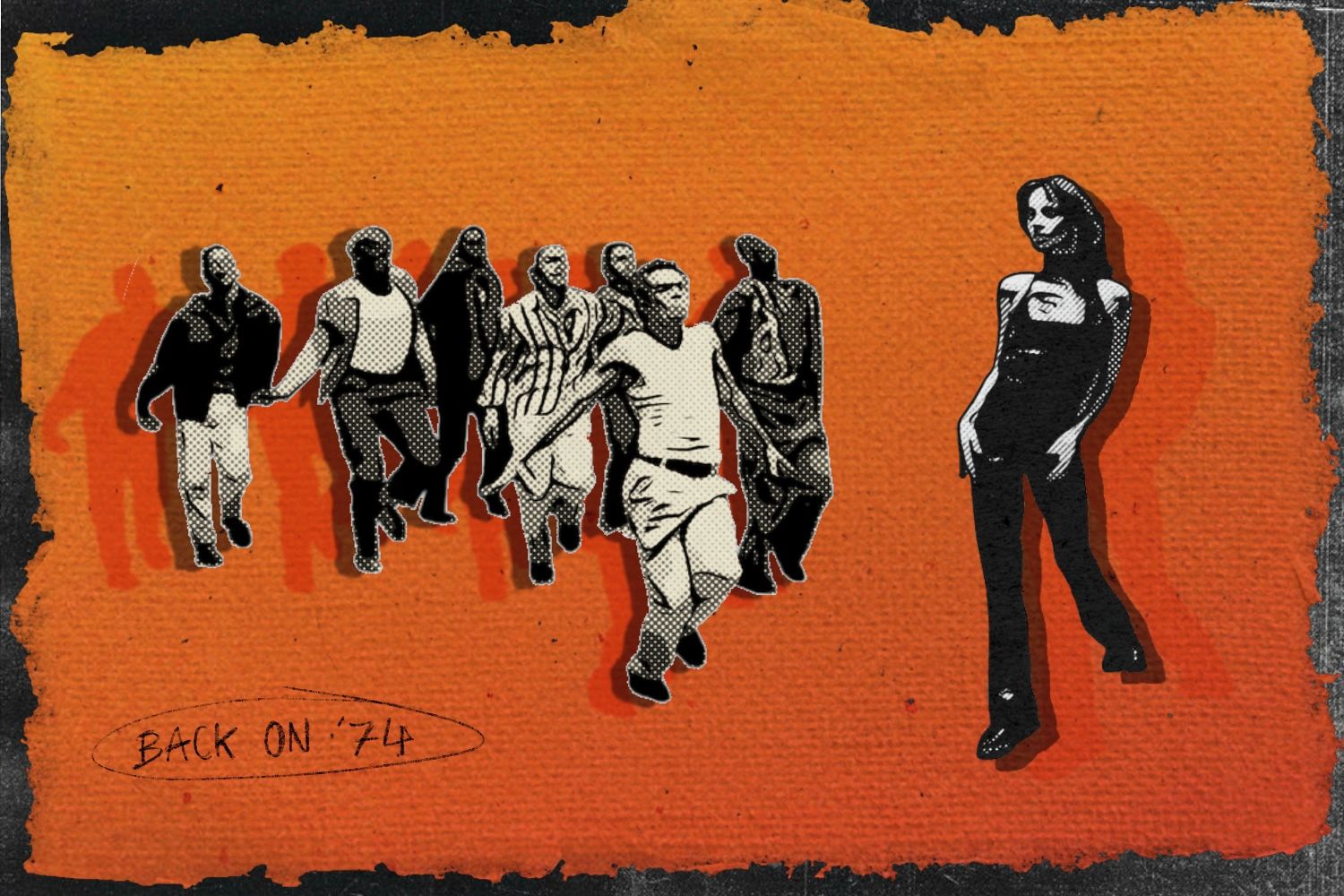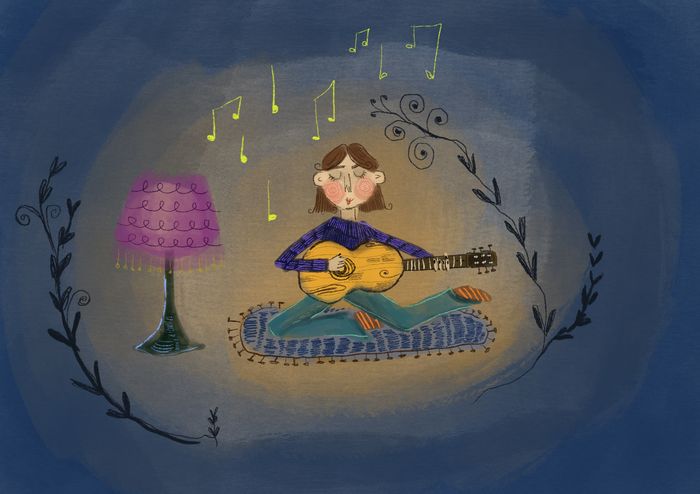Before they burst onto the British music scene in 2013, Jungle started as two childhood friends playing guitar together, alternating between their neighboring homes in Shepherds Bush. Tom McFarland, one half of the dance music collective, calls me from his studio in London to reflect on his early bond with bandmate Josh Lloyd-Watson and the trajectory of their careers since. Even before the slog of trying to make it in the industry, he tells me: “Music was the defining factor of that time spent hanging out together”.
As McFarland explains, their electronic production style is informed by “the nostalgic sound of genres that have come before us,” absorbed through a “global music education”. While he cites Pink Floyd and Four Tet as inspiring their experimental style, growing up in a multicultural area instilled in them that “we didn’t need to pigeon hole ourselves”. The slickly engineered sound of their albums is unmistakably modern while bearing all the marks of their love for soul, disco and 90s hiphop sampling.
In 2024 they sailed past Blur to win Best Group at the Brits, placing them in humble succession of small bands like The Beatles, Coldplay, and Radiohead. Amidst massive commercial success with four top ten albums, their one-shot dance videos have become almost as synonymous with the Jungle brand as the music.
“We’re not reinventing the laws of physics … I think that’s a testament to the simplicity of it”
In their music videos, dancers do the evocative heavy lifting you might expect from imagery. The camera pans to catch every extended limb, each guitar line and beat pronounced in the meticulous choreography. In putting dance alongside their music he admits: “We’re not reinventing the laws of physics … I think that’s a testament to the simplicity of it”. Enlisting dancers gives Jungle figureheads for their audience to associate with, framing the narrative progression of their albums with reappearing characters. McFarland adds: “It’s emotional, seeing choreographers and dancers interpreting your music so well. It takes on a whole new level and doesn’t feel like yours anymore.”
Having grown up with the cultural markers of MTV and Kerrang, Jungle feels nostalgic for a more expansive visual culture in music, before social media defenestrated the profitability of the music video. McFarland tells me: “I find that there’s no cultural value in the 30-second clip – it’s only being made for money and we as artists are meant to make things that transcend us.” He finds the mounting pressures on artists to cater to the algorithm frustrating, stating: “I think it’s a complete myth that people’s attention spans are shorter than they used to be. We’re just not giving them the chance to pay attention.”
“We’ve got to put the music and the art on that pedestal”
They certainly broke from the short format with Volcano, an hour-long, one-shot film composed of interweaved dance videos for all 14 songs on the album. McFarland and Lloyd cameo throughout, chain smoking in a 60s-style control room while overseeing the shooting of each video. This meta detail epitomises how the duo perceive their roles in the group: directing from behind the scenes is where they are comfortable. He explains: “We can’t put ourselves on a pedestal because we don’t have it in ourselves to do that, we’ve got to put the music and the art on that pedestal.”
By design, their spotify page is devoid of biographical information, their personal identities abstracted in their block colour album covers. McFarland cites MF DOOM and Daft Punk as inspirations, concept artists that literally make masks their iconography. “People come to Jungle as a conceptual project,” he explains. Just think “if Nike started making mugs” or if Ed Sheeran abandoned ballads and released “a super high-concept album… we’re not going to suddenly make a folk record”.
McFarland sees the question of reception as outside their creative remit, asserting that: “The way people consume is completely out of your control as an artist”. He notes that: “We’re almost specifically making music not for Radio One, and we’re still going on Radio One.” A commitment to being “100% across everything we make” and a “blind faith” in their ideas is how he backgrounds Jungle’s commercial success.
“You have to suppress the impulse to make music for social media”
More generally, he finds suspending judgement while writing “the single most difficult thing to do… you have to shut off the narcissistic element of your brain that pounces on that idea or spark” before it is fully formed. Turning to how fixating on marketability impedes on artistic integrity, he asserts: “You have to suppress the impulse to make music for social media. Otherwise what becomes the art form? Then social media dictates the art.”
McFarland emphasises that writing to capture the attention of social media is pointless. He diagnoses the tendency of pop music to “linger around a formula for success” making longevity as an artist rare. “There will be another way of engaging the masses in some sort of media – five years down the line you will have something aged and not timeless because you’ve made a product for a specific generation.” He quips that: “No one’s going to remember those bands that were nearly the Beatles’’ just as, for Gen Z, many boybands of the 2010s will likely fade into the shadows of One Direction. He remains confident that “good artists who will have long careers are still making music for the right reasons”.
Having almost been left off their latest album, ‘Back on 74’ was an accidental sensation, amassing about 465 million streams on Spotify after clipped videos of the dance snowballed into virality on TikTok. It was “the big shock” of the record, he shares. “We’re just quite lucky that the way that we make our dance videos happens to lend itself incredibly well to marketing stuff on tiktok” – “there’s a weird synchronicity there”.
“I don’t know whether the whole idea of counterculture exists as much anymore”
Since their breakthrough with ‘Busy Earning’, Jungle’s success has charted how pathways to commercial popularity have evolved. McFarland reflects that: “Musical culture is definitely less curated than it ever was. probably for the better”. What breaks into the mainstream is no longer within the jurisdiction of “the gatekeepers who were the producers of radio one or MTV” that “held a huge amount of cultural capital”. Streaming has democratised access to music by making vast libraries of music cheaply available.
McFarland recalls finding music he liked as a process of excavating below what was popular, digging through bootleg CDs and vinyls. Since streaming has pulverised physical sales, it has shifted the paradigm from musical ownership to access, but are connections to music weaker because it is easier to ingest?
He speculates: ‘‘Maybe there’s a bit less musical pride now that the things you love and don’t love exist in the same space’. As a result, he admits: “I don’t know whether the whole idea of counterculture exists as much anymore”. Hailing from a “totally pre-tiktok” ’generation, he resolves: “I don’t know what it’s like to be an 18-year-old kid in England at the moment, but when I was that age I knew that the music I listened to really defined who I was”.
As he comes to reflect on the chaos of Jungle’s most recent tour, he concludes: “It’s ultimately the best job in the world. We’ve never had to grow up and get a new job. Life doesn’t grate on you as much when you can express yourself artistically. You’re constantly able to emote, expend emotions, and I think there’s a buildup of that inside everybody constantly.”
Jungle are set to start work on their 5th album “when it’s finished or released… who knows!”


